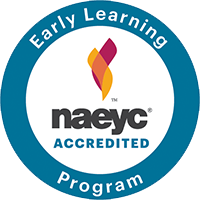- Child Development and Family Center
- Resources
- Articles
- The Not So Terrible Twos!
The Not So Terrible Twos!
By Jen Young (CDFC Teacher)
What’s the first thing that most adults think of when they hear someone talking about a 2-year‐old? Uh‐oh, the Terrible Twos! They have a reputation for being difficult, saying “no!” throwing tantrums, etc. Not to say that these things don’t happen, but there’s so much more to a 2‐year‐old that makes them terrific!
During this time, a child transitions from being a baby to their own little person – a person with thoughts, feelings and opinions of their own. At times, they have these feelings without the language to support it, or adults who may not understand them which can lead to tantrums and the difficult behaviors they are blamed for. They’re trying to figure out how the world works and how they fit in, what’s their role. That’s why it’s important to be patient and to help them find their place; enjoy this time with your 2‐year‐old!
2-year‐olds are learning to love. All of that unrequited love that you’ve given your child over the past two years is paying off as your child is able to show you how much they love you in return. Your young toddler could hug and kiss you, maybe repeat “I Love You”, but at this age you may hear your child saying it first to you or on their own. A somewhat older two may ask you, “How was your day?
"They're developing a sense of self. They're beginning to identify their feelings, which leads to an ability to perceive how other people feel," says Victoria Youcha, Ed.D, a child development specialist with Zero To Three.
Often we focus on the milestones that young children achieve such as walking, talking, etc. Empathy is a value that many parents want for their children, but we have to teach them that. Your child will learn what they observe you doing, so be a good role model. Children act on their feelings by examples they’ve seen.
They love to express themselves. 2‐year‐olds are full of opinions and have more language to express them. They will let you know if they like or dislike something. They may be able to tell you why they threw their food at dinner time, or ask for more of something they like. By the end of the second year they’re putting together three to five word sentences. Along with telling you what they like or dislike they’re also learning to tell you how they feel. In the heat of the moment they most likely will not be able to control their impulsivity and may hit or scream, but after they calm down you can talk about it. They’re able to tell you what made them sad or angry, and when they can tell you it eventually leads to less frustration.
They love to help! They’ve spent many hours watching as you take care of tasks around the house, and are fascinated by this. They love to imitate and please adults, so let them help out! After mealtime they can carry their things to the sink or dishwasher. You can give them a rag and let them pretend to clean the house, or really help if you use safe cleaning products. Having containers to put their toys away in can make it easier when you want them to clean up. Make it a game by singing a song. When it’s time to do the laundry your child can help to gather the clothes. Not only do they enjoy helping you but it teaches them about responsibility and they can continue to help as they get older. Planning a special activity such as baking together allows you to see just how much your child is capable of; they love pouring in the ingredients and helping to stir it together. It also is a teachable moment because you’re teaching about math and science while measuring and teaching about safety such as the oven is hot and is for grown‐ups.
They live to learn. 2‐year‐olds learn so quickly because they’re either involved hands on or because of how observant they are, they’re like sponges soaking it all up. It truly is amazing how much they learn between the ages of two and three. They’re intensely motivated to learn about how the world works, and love to watch their parents, teachers and other children. Use those everyday teachable moments to engage them and to get them involved. The independence they’re gaining also helps because not only do they want to watch, but they want to try it for themselves. Giving them opportunities to try things for themselves provides important learning experiences.
It may be hard to realize that your baby is growing up, and it may be frustrating because your child is coming across as stubborn, but it’s inevitable that children are going to grow. Celebrate your 2‐year‐old and accept the challenges that come along with it. The more you work towards helping them gain the skills that they desire and need the less frustration and battles you will have. Enjoy this time, because soon your child will be 3, and there are going to be challenges with every age but the foundation you set will help make it easier!
-
Resources for Parents
- Parent Handbook (PDF)
-
Parenting Articles
- The Art Process
- The Importance of Music and Movement
- Helping Children Become Good Readers
- Raising Infants and Toddlers Into People You Like to Be With
- The Importance of Self-esteem
- Alternatives to Spanking
- The Four Stages of Toilet Learning
- All About Potty Training
- Establishing a New Routine
- The Not So Terrible Twos
- Building a Routine and Sticking With It
- Developmentally Appropriate Practice: How Can We Recognize It in an Early Childhood Setting?
Contact Us
Child Development and Family Center
Campus Child Care Center Building
DeKalb, IL 60115
815-753-0125
815-753-8502 (fax)
jboyer@niu.edu
Hours of Operation
Monday-Friday
7:30 a.m.-5:30 p.m.
Child Development and Family Center Annex
The annex is currently closed.

